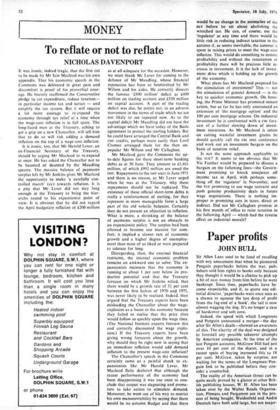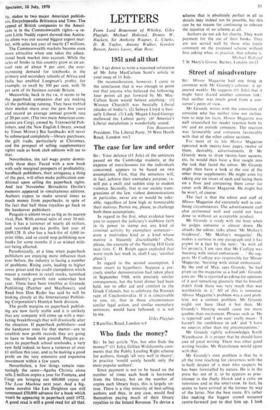Paper profits
JOHN BULL
Sir Allen Lane used to be fond of recalling with wry amusement that when he pioneered Penguin paperbacks, before the war, pubs fishers sold him rights to books only because they thought it would be a chance to pick up a bit of easy money from him before he went bankrupt. Since then, paperbacks have be- come respectable, and if, to quote one edi- torial director, 'paperbacks were once seen as a chance to squeeze the last drop of profit from the fag-end of a book', the tail is now almost wagging the dog. It's no longer a case of hardcover and soft core.
Indeed, the speed with which Longmans and Penguin announced a merger—the day after Sir Allen's death—showed an awareness of this. The alacrity of the deal was designed to forestall any possible takeover attempts by American companies. At the time of the last Penguin accounts, McGraw Hill had just over 10 per cent of the shares, and in a recent spate of buying increased this to 18 per cent. McGraw, taken by surprise, are waiting for the terms of the Longman/Pen- guin link to be published before they con- sider a counterbid.
The reality of the American threat can be quite easily proved by a glance at other Brit- ish publishing houses. W. H. Allen has been taken over by the Walter Reade Organisa- tion. Pitmans and Pergamon are in the pro- cess of being bought. Weidenfeld and Andre Deutsch have both sold large, but not major- ity, stakes to two major American publish./ ers, Encyclopaedia Brittanica and Time. The appeal of British companies to the Ameri- cans is in the Commonwealth rights—a re- cent Little Neddy report showed that Austra- lia alone was our second biggest export mar- ket, with sales last year of nearly £7 millions.
The Commonwealth markets become even more attractive when one takes the educa- tional book market into account. While the sales of books in this country grow at an an- nual rate of about 9 per cent, the ever- increasing demand for textbooks in the primary and secondary schools of Africa and India has enabled Longman's profits, for example, to swell by 300 per cent, with 70 per cent of its business outside Britain.
Meanwhile, back in the UK, it seems to be the paperback companies that are making all the publishing running. They have trebled their market share over the past five years and record an average annual growth rate of 20 per cent. (The two main American com- panies are Corgi, owned by Transworld Pub- lishers, and the New English Library, owned by Times Mirror.) But hardbacks will never be submerged completely—library purchases, the gift trade, particularly at Christmas, and the prospect of selling supplementary rights such as book club editions will see to that.
Nevertheless, the tail wags pretty domin- antly these days. Faced with a new book with only marginal prospects of profitability, hardback publishers, their arrogance a thing of the past, will often make publication con- ditional upon selling the paperback rights. And last November Bernadette Devlin's memoirs appeared in simultaneous editions. Authors expect to make several times as much money from paperbacks, in spite of the fact that half these royalties go back to the hardcover publishers.
Penguin is almost twice as big as its nearest rival, Pan. With annual sales of over 30 mil- lion it has a turnover of nearly £6 million, and recorded pre-tax profits last year of £609,128. It also has a back-list of 4,000 in- print titles, and so could stop publishing new books for some months if it so wished with- out being affected.
Paradoxically, at a time when paperback publishers are enjoying more influence than ever before, the industry is facing a number of problems. Rising costs, leading to higher cover prices and the credit clampdown which meant a rundown in retail stocks, tarnished the industry's growth rate somewhat last year. There have been trbubles at Granada Publishing (Panther and Mayflower), and Reed boss Don Ryder has said he will be looking closely at the International Publish- ing Corporation's Hamlyn book division.
The profit margins on paperback publish- ing are now fairly stable and it is unlikely that any company will come up with a mar- keting breakthrough that will drastically alter the situation. If paperback publishers—and the hardcover ones for that matter—are to establish new profit records they are going to have to break new ground. Penguin ex- pects its paperback school textbooks, a very new field indeed, to have a turnover of over £1 million this year, and to be making a good profit on the very extensive and expensive investment within a few years.
Nevertheless, a few things remain reas- suringly the same—Agatha Christie alone sells 2 million copies a year for Fontana, and Corgi are bringing out 600,000 copies of The Love Machine next year. And a big- name novelist like Len Deighton can still command £50,000 advance for a book which wont be appearing in paperback until 1972. A good read is still a good read for all that.























































 Previous page
Previous page